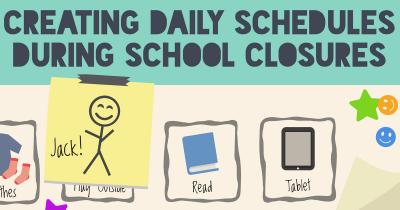We know many of you are facing the new challenge of distance learning during COVID-19-related school closures. We’re here to help.
Recently, Lisa Carey, assistant director of Kennedy Krieger Institute’s Center for Innovation and Leadership in Special Education (CILSE), received a note from a parent: “My child is in elementary school and can’t read the teacher’s instructions on his own, and I’m unable to help with every assignment while I’m also trying to work from home.”
“Parents are coming to me with concerns that this new at-home learning simply is not working for their children,” Carey says. “I’ve shared with them that it’s important to remember that teachers are also trying to teach students like this for the first time. It’s important to give teachers feedback and keep open lines of communication, as we all learn how to support students.”
 After many patients’ families and teachers reached out to CILSE with similar questions, the staff adjusted its Linking Research to Classrooms Blog to focus on distance learning during COVID-19-related school closures. (The blog typically features articles about the neuroscience of learning, and about teaching in a neurodiverse classroom.) With this new shift in focus, the blog is now offering resources for both teachers and families on how to navigate the new reality of distance learning.
After many patients’ families and teachers reached out to CILSE with similar questions, the staff adjusted its Linking Research to Classrooms Blog to focus on distance learning during COVID-19-related school closures. (The blog typically features articles about the neuroscience of learning, and about teaching in a neurodiverse classroom.) With this new shift in focus, the blog is now offering resources for both teachers and families on how to navigate the new reality of distance learning.
For everyone trying to help children continue learning at home during these unprecedented times, here are a few useful tips:
1. Home Learning Is Not Homeschooling
Given the emergency context of coronavirus-related school closures, our new reality of distance learning is not the same as traditional homeschooling. It’s important to take the pressure off of families who are often unprepared to recreate school in their homes.
Remember that school closures happened suddenly. The most important focus is helping students navigate this stressful time and finding ways to connect virtually with their teachers and classmates.
2. Create Daily Schedules
“To support mental health, it’s important to put together some semblance of a schedule,” Carey says. “It doesn’t have to be fixed, but you should have a pattern to your days.” Students—and adults, too—struggle when there’s a lack of predictability. Schedules still need to include digital-free time, as research has not changed regarding the overuse of technology.
Start by asking your child’s teacher for a copy of their classroom schedule. Create an at-home schedule that reflects a typical school day. Continue to shift the schedule as needed, and build in essential time for everyone in your household to find a sense of calm in our chaotic world.
3. Learn How to Evaluate Digital Resources
Parents and teachers are experiencing an influx of digital resource recommendations. If you’re feeling overwhelmed with figuring out which resources are worthwhile and meet educational standards, try asking these questions:
Does the activity really require technology? Is it free of charge for everyone? Is it accessible across all platforms? Does it include features that allow everyone to access the content?
For more information on this evaluation process, as well as a concise list of go-to digital resources, read the full blog post here.
4. Add Movement in Creative Ways
With online learning and working from home, we’re all sitting a lot more than normal. Try to encourage your kids (and yourself!) to include movement throughout the day.
“Find someone to do Zumba classes with your students as a dance elective,” Carey suggests to teachers. “Remember that learning happens in a lot of ways. Thinking about the new opportunities for learning, rather than the constraints, can help reframe [the situation].”
5. Consider Hands-On Learning Opportunities
Try baking a yummy treat, while using measurements to teach fractions. Often, teachers dream about these hands-on learning opportunities in their traditional classrooms, but now is the chance to try implementing these creative methods of learning.
We Are Here for You
Kennedy Krieger will continue to share valuable resources and helpful information to support teachers and students both socially and emotionally during the COVID-19 crisis, leveraging the Institute’s expertise in health, education and technology. When parents and teachers need our support, Kennedy Krieger is committed to helping unlock every child’s potential.















